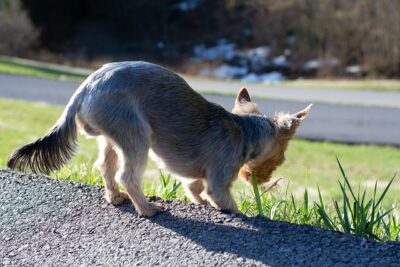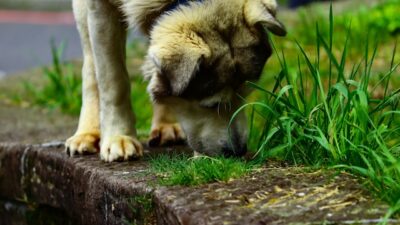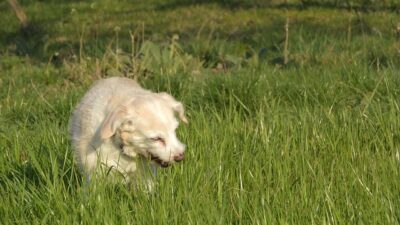Overview
Introduction to Why Do Dogs Eat Grass

Why do dogs eat grass?” It’s a question that has puzzled pet owners for generations. Many dogs seem to have a natural inclination to nibble on grass, but the reasons behind this behavior are not always clear. In this article, we’ll take a closer look at why do dogs eat grass, exploring the various theories and explanations that have been put forward by experts.
We’ll also address the question: Is there any reason why you shouldn’t let your dog eat grass? By the end, you’ll have a better understanding of this curious behavior and how to approach it as a responsible pet owner.
Setting the Scene: Dogs and Their Unusual Eating Habits
Dogs eating grass is a common behavior, with most dogs engaging in this activity at some point. While the exact reasons behind this behavior are not fully understood, it’s believed that dogs may eat grass to help alleviate an upset stomach or to fulfill a nutritional need.
Despite the prevalence of grass-eating, pet owners need to monitor their dogs’ plant-eating habits and ensure they are not consuming toxic plants. If you’re wondering, ‘Why do dogs eat grass?’, these reasons may shed some light on this curious behavior.
Purpose of the Article: Understanding the Reasons Why Do Dogs Eat Grass
In this article, we delve into the fascinating world of animal behavior science to unravel the mystery behind why do dogs eat grass. While grass eating is considered a normal behavior for many dogs, there are various theories about its purpose.
Some suggest that dogs may eat grass to alleviate an upset stomach or to fulfill a nutritional need, while others propose that it could be a remnant of their ancestral instinct to consume vegetation. Despite the common belief that dogs eat grass to induce vomiting, most dogs that eat grass do not vomit regularly.
Understanding why do dogs eat grass and the reasons behind this behavior can help pet owners better care for their furry companions.

The Natural Instinct: An Evolutionary Perspective
Ancestral Diet Composition
Dogs’ inclination to eat grass may stem from their ancestral diet composition. Like wolves, dogs are carnivores, but they also exhibit omnivorous behaviors, which could be attributed to their scavenging habits.
In the wild, wolves eat grass as part of the entire animal provided, including the stomach contents of their prey, which may contain partially digested vegetation.
This behavior could be an instinctual way for dogs to supplement their diet with fiber and other nutrients found in plants. Understanding why do dogs eat grass sheds light on their dietary behavior and evolutionary traits.
Instinctual Remedies for Ailments
Dogs eating grass is a common behavior that has been observed in canine companions for centuries. While some speculate it’s due to dietary deficiencies or stomach upset, others believe it’s an instinctual remedy for ailments.
According to applied animal behavior science, dogs may eat grass to self-medicate, as it can help induce vomiting, potentially relieving stomach discomfort. This behavior, known as “grass eating” or “grazing,” is considered normal unless it occurs excessively or is accompanied by other signs of illness.
Modern Dog Diets vs. Ancestral Diets
Dogs eating grass is a common behavior that has been observed in both modern dogs and their ancestors. While the exact reason for why do dogs eat grass is not fully understood, some experts believe it could be an instinctual behavior linked to their ancestral diet.
Modern dog diets often differ significantly from ancestral diets, which may lead to dogs seeking out grass as a source of nutrients or as a means of self-medication.
Despite the prevalence of this behavior, it’s important for pet owners to monitor their dog’s grass consumption to ensure it doesn’t lead to any digestive issues or other health problems.

Nutritional Necessity or Nutrient Deficiency?
Grass as a Source of Fiber
Dogs may eat grass for various reasons, and one theory suggests it could be due to a nutritional necessity for more fiber in their diet. Lack of fiber can lead to digestive issues, causing discomfort in a dog’s stomach.
By instinctively seeking out grass, dogs might be trying to supplement their diet with fiber. However, it’s essential to ensure that dogs are on a balanced, high fiber diet to prevent stomach problems and avoid the need for them to seek out grass for this purpose.
Unmet Nutritional Need and Micronutrient Deficiencies and Their Impact
Dogs may eat grass due to unmet nutritional needs, including micronutrient deficiencies, in their diet. A balanced diet is essential for meeting a dog’s nutritional requirements, and a deficiency in certain micronutrients can lead to unusual behaviors like a dog eating grass.
Micronutrient deficiencies can impact a dog’s overall health and well-being, highlighting the importance of addressing any dietary deficiencies promptly. Regularly assessing and adjusting a dog’s diet can help ensure they are receiving all the necessary nutrients to maintain their health and well-being, thereby reducing the likelihood of behaviors such as eating grass to supplement their diet.
Balancing the Diet: Importance of Complete Nutrition
Dogs may eat grass due to unmet nutritional needs or dietary deficiencies in their diet, which can lead to nutritional deficiency. Providing a complete and balanced diet is crucial to meeting a dog’s dietary needs and preventing them from seeking out grass as a supplement.
By ensuring that a dog’s diet is nutritionally complete, including all essential nutrients, owners can help address any potential causes of unusual behavior such as eating grass. Consulting with a veterinarian or animal nutritionist can help determine the best diet for a dog to maintain their health and well-being, reducing the likelihood of them consuming plant material like grass.
In addition to a balanced diet, some dogs may benefit from supplements such as omega-3 fatty acids, which can support skin and coat health, as well as joint supplements like glucosamine and chondroitin to support joint health. However, it’s important to consult with a veterinarian before starting any new supplements to ensure they are safe and appropriate for your dog’s specific needs

Exploring Digestive Benefits of Dog Eating Grass
Aiding Digestion: Grass as a Natural Laxative
Dogs eating grass may be a natural behavior aimed at aiding digestion. Grass can act as a natural laxative, helping to move food through the digestive system and promote regular bowel movements.
Additionally, the fibrous nature of grass may help to clean the dog’s stomach lining and assist in the expulsion of indigestible materials. While occasional grass consumption is generally considered normal, owners should monitor their dog’s behavior and stool samples for any signs of digestive issues.
Intestinal Parasites: Myth vs. Reality
The idea that dogs eat grass to treat intestinal parasites is a common myth. While some believe that grass could help dogs purge parasites from their system, there is limited scientific evidence to support this claim.
In reality, dogs may eat grass for various reasons, including as a natural behavior or to aid digestion, but it is not a reliable method for addressing intestinal parasites. Owners should consult with a veterinarian for appropriate parasite prevention and treatment options for their dogs.
Veterinary Insights on Digestive Health
If your dog is showing signs of digestive distress, such as vomiting after eating grass, it’s essential to consult with a veterinarian. While occasional grass consumption is usually harmless, excessive grass ingestion could indicate underlying health issues or dietary deficiencies.
A veterinarian can provide insights into your dog’s digestive health and recommend appropriate measures to ensure their well-being.

Dog Behavior and Psychological Aspects of Eating Grass
Boredom or Anxiety: Seeking Stimulation
Dogs may eat grass simply as a way to alleviate boredom or anxiety, seeking mental stimulation when they are not sufficiently engaged. Providing adequate mental and physical exercise can help distract a dog from eating grass out of boredom.
Additionally, addressing any underlying anxiety through training, environmental enrichment, or behavioral therapies can help reduce this behavior.
Mimicking Behavior: Influence of Other Dogs
One of the suggested reasons why dogs may eat grass is to mimic the behavior of other dogs, particularly younger dogs. If a dog sees another dog in the household or in the vicinity eating grass, they may be inclined to do the same out of curiosity or a desire to imitate.
However, it’s important to monitor their grass consumption to ensure they do not eat too much grass, which could lead to digestive issues.
Stress and Comfort: Grass as a Calming Mechanism
Some dogs may eat grass as a way to cope with stress or seek comfort, similar to how people might use comfort food. The act of chewing grass may have a soothing effect on some dogs, helping them relax during stressful situations.
However, it’s important for owners to address the underlying causes of stress in their dogs and provide appropriate outlets for relaxation and comfort to prevent excessive grass consumption.

The Temptation of Taste and Texture
Palatability: Why Grass Might Be Appealing
The taste and texture of grass may be appealing to some dogs, leading them to eat it. While grass is not a typical part of a dog’s diet, its freshness and natural flavors could attract dogs, especially if they have dietary deficiencies or nutritional imbalances.
However, if a dog eats grass and becomes sick, it’s essential to consult with a veterinarian to rule out any underlying health issues or dietary deficiencies.
Sensory Exploration: Dogs’ Unique Perspectives
Dogs may eat grass as part of their sensory exploration of the world around them. The taste and texture of grass can be intriguing to dogs, leading them to experiment with eating it.
While occasional grass consumption is usually harmless, if a dog eats grass and becomes sick, it’s important to consider potential dietary deficiencies or underlying health issues and consult with a veterinarian for proper evaluation and advice.
Texture Preference: Crunchy Greens and Canine Taste Buds
Some dogs may be attracted to the texture of grass, particularly the crunchy greens, which can be appealing to their taste buds. While dogs are primarily carnivorous, their occasional consumption of grass could be due to a natural preference for different textures in their diet.
However, if a dog eats grass and becomes sick, it’s important to consider potential dietary deficiencies or underlying health issues and consult with a veterinarian for proper evaluation and advice.

Health Implications: Risks and Concerns
Pesticide and Chemical Exposure
Eating grass can pose risks to dogs if the grass has been treated with pesticides or other chemicals. Dogs that regularly eat grass and vomit may be at risk of ingesting these harmful substances, which can lead to gastrointestinal upset or other health issues.
Dog owners need to monitor their pets’ behavior and environment to minimize the risk of exposure to pesticides and chemicals.
Plant Toxicity: Identifying Harmful Species
Some plants can be toxic to dogs, and if a dog eats grass regularly and vomits, it’s important to consider the possibility of plant toxicity. Common plants that are toxic to dogs include lilies, azaleas, and sago palms, among others.
Pet owners should be vigilant in identifying and removing potentially harmful plants from their environment to prevent accidental ingestion.
Frequency and Excessive Consumption: When to Be Alarmed
While it’s normal for dogs to occasionally eat grass, excessive consumption could indicate an underlying issue. If a dog regularly eats grass and shows signs of discomfort or sickness, such as vomiting or diarrhea, it’s essential to consult a veterinarian.
Excessive grass consumption can sometimes lead to gastrointestinal irritation or other health problems, so it’s important to monitor your dog’s behavior and seek veterinary advice if you have concerns.

Practical Tips for Dog Owners
Monitoring and Moderating Grass Consumption
To monitor and moderate your dog’s grass consumption, it’s essential to observe their behavior and intervene if they start eating excessive amounts. Ensure your dog has a balanced diet to prevent them from seeking out grass as a dietary supplement.
Regularly inspect your yard for any toxic plants and remove them promptly. Providing your dog with plenty of mental and physical stimulation can also help reduce their desire to eat grass out of boredom or anxiety.
Providing Alternative Chew Toys and Treats
Providing your dog with alternative chew toys and treats can help redirect their desire to eat grass. Chew toys that are safe and durable can satisfy your dog’s natural urge to chew, while treats can provide a tasty distraction.
Additionally, interactive toys that dispense treats can keep your dog engaged and mentally stimulated, reducing the likelihood of them eating grass out of boredom.
Consultation with Veterinarians: When to Seek Professional Advice
If your dog is regularly eating grass and experiencing digestive issues or appears unwell, it’s crucial to seek professional advice from a veterinarian. A veterinarian can help determine the underlying cause of your dog’s behavior and provide appropriate treatment.
Additionally, they can offer guidance on how to manage your dog’s diet and behavior to prevent further issues related to eating grass.

Conclusion: Why Do Dogs Eat Grass
Recap of Key Points: Understanding the Multifaceted Reasons
Dogs eating grass is a common behavior with various reasons behind it. While some dogs eat grass to aid digestion or fulfill a nutritional need, others may do it out of boredom, stress, or to mimic behavior.
Understanding why do dogs eat grass is important for pet owners to monitor their dogs’ grass consumption and seek veterinary advice if they show signs of discomfort or sickness after eating grass.
Appreciating Dogs’ Unique Dietary Behaviors
Dogs’ dietary behaviors are influenced by their evolutionary history and natural instincts. While dogs are primarily carnivores, they may exhibit omnivorous behaviors, including eating grass.
Understanding and appreciating these behaviors, including why do dogs eat grass, can help pet owners provide a balanced and fulfilling diet for their dogs.
Promoting Responsible Ownership and Understanding
Responsible pet ownership involves providing a safe environment for dogs to explore and ensuring they have a balanced diet. Pet owners should monitor their dogs’ behavior and consult with a veterinarian if they have any concerns about their dogs’ health or dietary habits.
Understanding the reasons behind why do dogs eat grass can help promote responsible ownership and ensure the well-being of canine companions.
If you’re looking for a new furry friend in Florida, check out our thoughtfully bred puppies for sale in Florida and surrounding areas. Our puppies are healthy, friendly, and cared for as family, guaranteeing a perfect new addition to your family.
Frequently Asked Questions: Why Do Dogs Eat Grass
- Why do dogs eat grass?
- Dogs may eat grass for various reasons, including fulfilling a nutritional need, aiding digestion, or seeking comfort or stimulation. While occasional grass consumption is normal for many dogs, excessive grass eating could indicate an underlying issue that should be addressed.
- Is it normal for dogs to vomit after eating grass?
- While some dogs may vomit shortly after eating grass, it’s not considered a normal or healthy behavior. If a dog vomits regularly after consuming grass, it could indicate an underlying issue that requires veterinary attention.
- Can eating grass hurt my dog?
- Eating grass itself is not usually harmful to dogs, but it can lead to digestive issues if consumed excessively or if the grass is contaminated with pesticides or other chemicals. It’s important to monitor your dog’s grass eating habits and ensure they are not ingesting non-food items.
- Could my dog’s grass eating habits be a sign of a dietary deficiency?
- Yes, dogs may eat grass to supplement their diet with nutrients they are lacking. If your dog is consistently eating grass, it may be worth consulting with a veterinarian to ensure their diet is balanced and meeting their nutritional needs.
- Should I be concerned if my dog is eating grass and vomiting?
- Yes, if your dog is eating grass and vomiting regularly, it could indicate an underlying health issue. It’s important to monitor your dog’s behavior and consult with a veterinarian to determine the cause of the vomiting and address any potential dietary deficiencies or other health concerns.
- How can I prevent my dog from eating grass?
- To prevent your dog from eating grass, ensure they are on a balanced diet that meets their nutritional needs. Provide plenty of mental and physical stimulation to prevent boredom, which can lead to grass eating. Regularly inspect your yard for toxic plants and remove them promptly to reduce the risk of your dog ingesting harmful substances.
- When should I seek veterinary advice for my dog’s grass eating habits?
- If your dog is eating grass excessively, vomiting regularly after consuming grass, or showing signs of discomfort or illness, it’s important to seek veterinary advice. A veterinarian can help determine the underlying cause of your dog’s behavior and recommend appropriate treatment or dietary changes.
- Is there any reason why you shouldn’t let your dog eat grass?
- While eating grass is generally safe for dogs, there are some reasons why you might want to discourage this behavior. Some dogs may eat grass that has been treated with pesticides or other chemicals, which can be harmful if ingested. Additionally, if a dog consumes too much grass, it can lead to digestive issues or obstructions. Monitoring your dog’s grass-eating habits and ensuring they have a balanced diet can help mitigate these risks.
- Does eating grass usually lead to throwing up?
- Contrary to popular belief, eating grass doesn’t usually lead to throwing up. Less than 25% of dogs that eat grass vomit regularly after grazing. While some dogs may vomit shortly after eating grass, it’s not considered a normal or healthy behavior. If your dog is vomiting regularly after consuming grass, it could indicate an underlying issue that requires veterinary attention.




